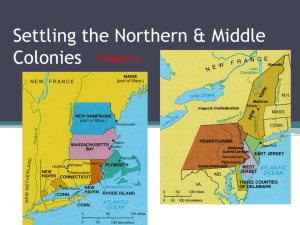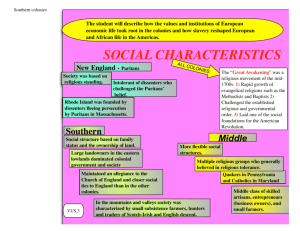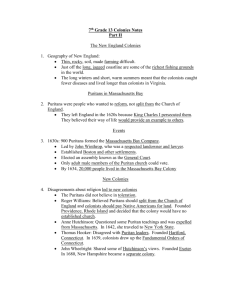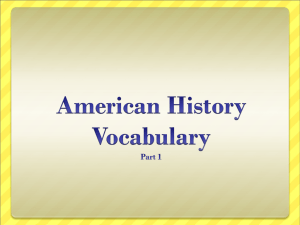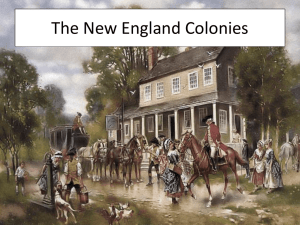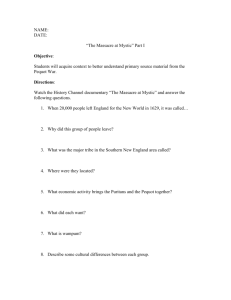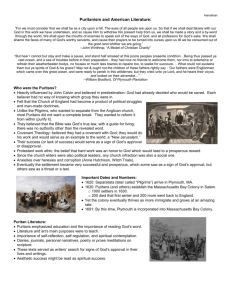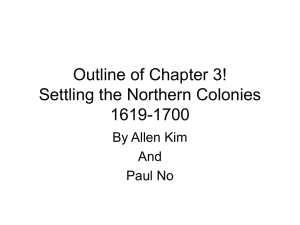Unit 1 British America - Kenston Local Schools
advertisement
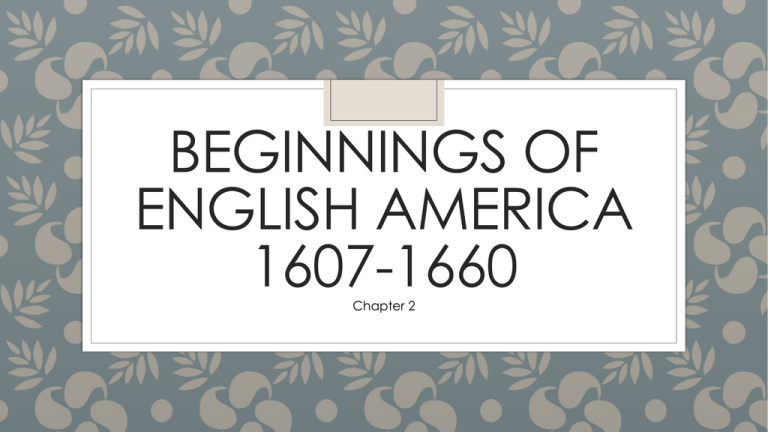
BEGINNINGS OF ENGLISH AMERICA 1607-1660 Chapter 2 England and the New World: Unifying the English Nation ◦ England got a rather late start in Colonial game◦ 1400-1500s occupied by War of the Roses (Cousins War) and religious/dynastic struggles of Tudors (are we catholic or protestant today?)…won’t be until reign of Elizabeth (and defeat of Spanish Armada 1588) that they get in the game. England and Ireland ◦ England learned to be a colonial power in Ireland. ◦ Ireland is not giving up Catholicism, and that makes protestant rulers unhappy. Gov’t will use (at various times) military conquest (including killing civilians) and land seizure to bring population in line ◦ Tried moving protestants there- and giving them land. “Plantation” is a group of people “planted” in an alien population- term is 1st used in Ireland. (whose native population was often compared to Native Americans in the 1600s) England and North America/Spreading Protestantism ◦ Sir Humphrey Gilbert and Sir Walter Raleigh were both given charters to est British colonies in the new world – which failedperhaps b/c of lack of government support. Most famous is Roanoke (Raleigh) in Virginia which disappeared between 1587-1590 ◦ Reformation and attack of Spanish Armada in 1588 made Spain England’s “enemy”. So it was easy for gov’t to say they needed to “liberate” New World from them. (black legend, las Casas etc) ◦ It is interesting the British begin their colonization with rhetoric of “freedom”, as well as of course a path to wealth and power (anxious to be taken seriously by larger more important countries) The Social Crisis ◦ Impact of crops from Columbian Exchange HUGE for population of Europe as a whole, and England’s population grew from 3 million in 1550 to 4 million in 1600. This (plus influx of gold/silver from Spanish treasure) leads to massive inflation. ◦ In order to make more $$, landowners begin to use scientific farming methods and Enclosure (remember this from last year?) which limits the amount of land peasants have available. Many will become industrial workers eventually, but at the moment nearly ½ the population of England lived below the poverty line. Laws against poor were harsh, and as one way getting rid of problem, Gov’t supports them moving to colonies. This is different from Spanish or French empires- and will have a important impact on why WE turn out the way we do- we have a much larger European/native American ratio. Masterless Men ◦ Working for wages was not considered a good occupation in the 1600s- the unemployed sometimes had to be “forced” to accept jobs. ◦ Landownership was the key to political rights, and to control your own destiny was considered “true freedom”. But land is really hard to get in Europe without significant $$. Going to the new world offered a unique opportunity for those born without privilege (American dream is there before we are even America) Land is the real treasure of the British colonies. The Coming of the English: English Emigrants ◦ If you left England for the new world you were taking a huge physical risk (death rates were REALLY alarming in the 1st decades of English colonies). The fact that more than 500,000 people left England between 1600 -1700 tells us 2 things ◦ 1. How rough the econ/social conditions of England were (to drive to extreme change) ◦ 2. How much better opportunities were (or were perceived to be) in the New World ◦ North America NOT the most popular destination – Ireland and the West Indies were. (there is BIG $$ in sugar) 360,000 went there. ◦ BUT: by the middle of the 1600s there are ◦ 120,000 in Chesapeake (Tobacco) ◦ 21,000 in New England (Puritans) ◦ 23,000 in Middle Colonies ◦ Majority (other than Puritans/Quakers- who came as families) are young, single men from the bottom rungs of English society. Indentured Servants ◦ If you had $$ to pay for your passage you could buy/claim land as soon as you got here. But 2/3 of the people who came during the 1600s didn’t have the capital to GET here. ◦ So they became Indentured Servants, promising 5-7 years of labor in exchange for passage. Their labor could be bought/sold, could not marry w/o permission, and could be physically punished “within reason”. (remember, this is an age where you could beat your wife as long as you didn’t use a stick thicker than your thumb) ◦ When term finished were supposed to get “freedom dues” payment of tools/wages/land. BUT that was if you survived… ◦ Indentured servitude will limit slavery during the early years of colonization. But employers constantly complained of servants being lazy, running away, or the need to get new ones every few years…. Englishmen and Indians ◦ British don’t want to “conquer” (that’s SO Spanish), they just want Native Americans to go away. (helped by the same population decimation from European diseases) Many of the Native Americans who lived in areas colonized by the British were at least semi-nomadic….made it easier to get them to move. Displaced native population more thoroughly than any other European empire ◦ Marriage between Pocahontas and John Rolfe was famous- and fairly unique. No mestizo population. ◦ Said Indians had no claim to land since they didn’t “improve it”. But they built towns on sites cleared by Indians, planted Indian crops, and adopted Indian technology (canoes and snowshoes) Summary of Relations between Europeans and Amerindians Spain Encomienda (slavery) Mission system Pope’s Rebellion Mestizos France Trade Jesuits Alliances Enemy of Iroquois England Removal Pequot & King Philip’s Wars Anglo-Powhatan Wars Transformation of Indian Life/Changes in the Land ◦ Indians benefitted from new tech too- and therefore initially many groups welcomed Europeans. Loved woven cloth, metal tools and cooking utensils, and guns… also introduced to alcohol. ◦ Trade with Europeans became a path to “cool” goods, so Indian life patterns began to shift. Men spent more time hunting for the furs Euros wanted. Overhunting of deer/beaver. Lots written about how Indians trade land etc for trinkets- but both sides were trading things they had in abundance for things they wanted. ◦ As Europeans arrive Indians are forced west- which actually created greater conflict between tribal groups than with Europeans ◦ Changes to Environment come from Intro of European animals (esp big ones like pigs, horses and cattle), as well as deforestation as Euros clear land for farming, homes and business. THE SOUTHERN COLONIES TH IN THE 17 CENTURY Jamestown Founded 1607 First Africans Arrive in Jamestown 1612 John Rolfe Plants Tobacco in Virginia 1619 Carolina Founded 1634 Maryland Founded 1670 1676 Bacon’s Rebellion Settling the Chesapeake The Jamestown Colony ◦ 1607 Jamestown Virginia the 1st permanent British colony in the New World. Poor choice of location- next to a swamp (malaria) and the settlers dumped their trash in slow moving river, then drank out of it (dysentery/typhoid) ◦ Colony nearly failed 1607-08. Worst segment was “starving time” in winter of 1610. Where 340 of 400 settlers die. Only 1200 of 8000 settlers who arrive before 1625 will survive. ◦ Many of the earliest settlers who came to Virginia were from upper classes (comparatively) and had more interest in treasure than “work”. Forced John Smith’s famous “He who does not work shall not eat” pronouncement – and essentially a military dictatorship. REPRODUCTION OF THE EARLY JAMESTOWN SETTLEMENT From Company to Society ◦ Rocky circumstances forced a fairly military regime during the early years, but this is a business, and they need people to come (and work) in order to make $$. In an effort to attract settlers, in 1618 the company issued a “Charter of Grants and Liberties” which created an elected legislature: the House of Burgesses (landowners) Not full democracy. Only landowners vote, company appoints governor. But still a step. ◦ Also created the “head right system” : any colonist who brought over a settler got 50 acres of land. 1620 the 1st black slaves arrived in Virginia- but Indenture was considered better b/c you got land Powhatan Confederacy/Uprising of 1622 ◦ Powhatans were the local tribe. Began fairly cooperatively with colonists. “Capture” of John Smith was and “rescue” by Pocahontas was symbolic- a demonstration of native power ◦ But relations became more hostile as it became clear that English had no intention of sharing land. And once tobacco (which depletes soil and therefore needs TONS of land) is in the picture things get even worse. ◦ 1622 Powhatans (under Pocahontas’s brother Opechancanough) attack- killing nearly 1/4 of the English population. But English come back with reinforcements and pretty much wipe out the tribe. Treaty signed in 1644 required coastal Indians to move to “reservations” (a fun word that will come back lots of times)and forbade them from entering European settlements without permission. ◦ Virginia colony never made $$, and will lose it’s charter in 1624. (VA becomes a royal colony) BUT – a new product is being grown (introduced by Pocahontas vi her husband) A Tobacco Colony ◦ King James was not a fan of tobacco (one reason VA became a royal colony was b/c he wanted to limit production) but the rest of Europe was- and it soon became their primary product. In 1624 200,000 lbs were grown, by 1665 it was 15 million lbs ◦ Created a “get rich quick” attitude- they grew it EVERYWHERE (even the streets). Tobacco depletes nutrients from soil, you constantly need new land. Early settlers and those with good finances back in England used purchase and headright system to gain “the best” land (along coast/rivers for easy transport ◦ Growth in agriculture needs workers- of the 120,000 who came in the 1600s, ¾ came as indentured servants. Southern land ownership was smallest number of hands compared to other colonies- the south will have “landed aristocrats” – most like English hierarchy. THE SOUTHERN COLONIAL ECONOMY Women and the Family ◦ Men outnumbered women 5/1 in the Chesapeake for most of the 17th century (single men in their 20s were the largest immigrant group). The majority of women who came were also indentured servants- and while there were plenty of options for marriage, they had to wait until their term was up. (therefore married later and had fewer kids) ◦ Life expectancy in the Chesapeake was 10 years shorter than it was in England (where it was only in the 40s anyway) so a traditional patriarchy was harder to develop. ◦ Women were permitted “dower rights” they could inherit up to 1/3 of a husband’s property if he died 1st- then when she died it went to his male heirs. And given the less formal society of the colonies, women tended to have greater independence as well. Even if it was the “independence” of a life of hard agricultural work and an early death…. The Maryland Experiment ◦ Founded 1632 as a proprietary colony by George Calvert (Lord Baltimore) ◦ By this point tobacco is a viable economy, and Calvert was looking to increase his fortune. But he had another motivation, he was from one of the last noble families in England to still practice Catholicism. Catholics in England faced discrimination and persecution. Hoped Maryland would be a haven for them. Religion in Maryland ◦ From the outset, protestants outnumbered Catholics in the colony (as they did in England) and they brought their prejudices with them. Protestants resented privileges and land grants given to Catholics. ◦ 1649 Act of Toleration passed: Guaranteeing equal protection of the law to all Christians. (but not anyone else) Calvert saw Maryland as a feudal territory- no discussion of representation in government. MARYLAND ACT OF TOLERATION, EXCERPT … Be it Therefore also by the Lord Proprietary with the advise and consent of this Assembly Ordeyned and enacted …that no person or persons whatsoever within this Province…thereunto belonging professing to believe in Jesus Christ, shall from henceforth be any ways troubled, Molested or discountenanced for or in respect of his or her religion nor in the free exercise thereof within this Province or the Islands thereunto belonging nor any way compelled to the belief or exercise of any other Religion against his or her consent… THE NEW ENGLAND COLONIES TH IN THE 17 CENTURY Harvard College founded Pilgrims arrive in Plymouth 1620 King Philip’s War 1629 Puritans found Massachusetts Bay 1636 1644 Rhode Island founded 1675 1692 Salem Witch Trials The New England Way The Rise of Puritanism ◦ Henry VIII had split with Church b/c of power, not doctrine. Therefore, the doctrine of the Anglican Church was very similar to Catholicism. Many did not feel that was ENOUGH of a change, that Anglicanism was not TRULY protestant. Many will choose to leave England altogether and come to the colonies for religious reasons. Two major groups came ◦ Separatists (Pilgrims): wanted a full break with the Anglican church, to create something entirely new based on Calvinist theory. Believed only “Saints” (those who had received “covenant”, the blessing of God) should be church members. Very small group ◦ Non Separatists (Puritans): Wanted to reform the Anglican church from within. Much larger #s, will be the dominant force in New England character. ◦ All Calvinists believed in “predestination”, reading the bible, and the importance of the sermon - therefore an educated minister- in religion. (Book says average heard 7000 sermon in lifetime…wow!) Protestant work ethic, idleness/immorality signs of the devil Moral Liberty ◦ Charles I had strong ties to France (and had been raised Catholic) and seemed – to Calvinists- to be “restoring Popery”. Puritans spoke of being persecuted, but they really weren’t (certainly not like other religious minorities in Europe). ◦ Thought society was corrupt (evidence was the poverty etc in England) and wanted to create “A City Upon a Hill” away from religious and worldly decay. ◦ “Freedom” to a Puritan, meant the freedom to obey God’s will through self government, self denial, and self punishment (super cheerful) NOT the ability to do what you want (idle hands are the devil’s playground etc…) ◦ “Christian Liberty” had no issue with censoring speech, actions etc – otherwise, anarchy was sure to follow. Pilgrims at Plymouth ◦ Pilgrims had already left England in 1608 to live in Netherlands (Calvinist) But they didn’t like it. (“too Dutch” – literally) Got permission from Virginia company to settle on their lands- and 102 people (both Separatist and plain Puritan) arrived in the new world in 1620. Missed Virginia- landed on Cape Cod, and knew they were in the wrong place- that’s why they created the Mayflower Compact: to create order. (got rights to land 1626- but never had an actual charter) Agreement to abide by the will of the majority (only male churchmembers will get to vote) ◦ Like Jamestown, Plymouth had tough first years. ½ died 1st winter (they land in October, no time for crops)- 1621 Squanto (a Wampanoag indian) teaches them to grow corn, and use plants in area so by harvest they are ready for “Thanksgiving” ◦ All land held in common until 1627, when it was divided among settlers. Plymouth was an independent colony until 1691, but it was never as $$ important as Mass. Bay to the north. The Rev. John Robinson and others aboard the Mayflower “Having undertaken, for the Glory of God, … and honor of our King and Country, a voyage to plant the first colony in the Northern parts of Virginia, …covenant and combine ourselves together into a civil body politic; for our better ordering, and preservation… and by virtue hereof to enact, constitute, and frame, such just and equal laws, ordinances, acts, constitutions, and offices, from time to time, as shall be thought most meet and convenient for the general good of the colony; unto which we promise all due submission and obedience.” Mayflower Compact, 1620 -- Rule of the majority (meaning adult male church members) PLYMOUTH PLANTATION The Great Migration ◦ Massachusetts Bay Est 1630- by Puritans. Far more organized and planned than Pilgrims at Plymouth- 700 people came in 1st group, 2000 in 1631, 12,000 will be there by 1640, 20,000 by 1642. (Actually over 60,000 people will leave England, other go to West Indies etc) Had a Royal Charter- not corporate (King Charles was not a fan of Puritans, gave them good terms to leave) though within their own group they will create a joint-stock situation. Great Migration end with the start of the English Civil War (1642-49) and Puritan rule of England under Cromwell eliminated the need to leave. ◦ Unlike Chesapeake- where single men came to make a fortune- New England colonists came as families, so greater balance of women, children etc… (and puritans racked up big families, with wonderfully bizarre names like Charity, Humiliation, Silence, Repentance, and Abstinence) ◦ Climate much healthier- it’s cold, but that kills bacteria/germs, people who came to New England had a life expectancy 10 years greater than if they had stayed at home, 70 years The Puritan Family ◦ These are strict people, obedience (of wife, children, servants) is a primary virtue. Women were considered the “spiritual equal” of men, and could become “covenanted” – but men were in charge, and “correction” of wives/children not considered a problem. ◦ John Winthrop (perpetual governor of Mass Bay) said women achieved “true freedom” from being wives/mothers, and “embracing their husband’s authority” (I would have been a horrible Puritan- just sayin’). Had an average of 7 children Government and Society ◦ Believed that God would favor them as long as they maintained a “moral” society. Each town was self governing, each had their own Congregational church. The “Elect” (or Saints) were responsible for those in the community who had not received God’s blessing, any male churchmember can be a part of gov’t (about 2/5 of population). Land distributed based on original investment, and all towns planned. Townhall meeting often help up as model of pure democracy, because even those w/o a vote could speak (men) ◦ Shareholders of Mass Bay Company emigrated to America- and took charter with them Created a gov’t based on English model- a 2 house legislature, a governor, and an independent judiciary. ◦ Consent of the governed was very important to Puritans, equality was not. Anyone can worship/speak, but members/investors were in charge of decision making. But as time went on it was harder to prove that you were one of the “elect”. Church and State in Puritan MA ◦ Again, equality was not their thing. “Goodman/Goodwife” were not as important as “Gentlemen/Ladies” or “Master/Mistress”. Social order was part of God’s will, if you weren’t high up, he doesn’t like you- work harder. ◦ Also had no problem with slavery- there are slaves in MA from 1640 (though never many, wrong sort of climate for large agriculture etc) ◦ ZERO religious tolerance – you could be put to DEATH for doing it wrong (including witchcraft of course) Ministers influenced admission to church membership by conducting public interrogations of people claiming to have experienced conversion. ◦ YET- clergy were NOT allowed to hold elected office, which was important in idea of separation of church and state. New Englanders Divided/Roger Williams ◦ If you get in trouble in a Puritan community, or were considers a “threat to social harmony” (for things like complaining, criticizing etc) they may kick you out- literally. You could be stuck with nowhere to go. ◦ Roger Williams: Challenged Mass Bay policiesparticularly regarding Native Americans (said it wasn’t fair Puritans just “took” land) Also said gov’t had no right to regulate religious behavior (in MA church was compulsory), said that was between a person and God, what he called “soul liberty”. Believed in religious tolerance…. Rhode Island and Connecticut ◦ Roger Williams banished – he founds a rival colony at Providence in 1636 (By BUYING land from Natives). Hallmark of Rhode Island was COMPLETE religious tolerance- even for non Christians (Indian Religions and Jews) Got an official charter in 1644 ◦ Also known for entire separation between church and state- no taxes to support church. (which was done in Chesapeake and rest of New England) Assembly elected 2x a year, new Governor every year. ◦ RI Developed most individualistic and independent population in Northern ½ of colonies (N Carolina will be the other) ◦ Connecticut: Founded 1636, by a group of Boston Puritans (under Rev. Thomas Hooker) who felt rule of law in Mass was rather arbitrary and oppressive- wanted more individual freedom. New Haven- founded 1638 by separatists who wanted MORE rules. Two colonies united in 1660. ◦ Fundamental Orders of Connecticut: the 1st official “constitution” in American History (in that it was a completely defined organization of govt). Provided for representative democracy of landowning men (not only churchmembers) MAP OF COLONIAL NEW ENGLAND The Trials of Anne Hutchinson Anne Hutchinson: Also questioned church rules- said people could read bible at home for themselves- had no need of a church to find salvation (Luther).Said ministers were basing “salvation on church attendance Antinomianism: if a person is “elect” then they don’t need to follow any rules/lawsit’s done. Really she offended most by being a well read, intelligent woman. Tried for Heresy twice (once while pregnant) and way out talked those who questioned her. BUT she also claimed God spoke directly to herand Puritans think that’s witchcraft. Banished. She and her family killed by Indians- Puritans saw it as God’s judgement Relations with Indians ◦ Calvinists aren’t into conversion- if God wants you he’ll let you know. And since Natives clearly NOT elect, they have no role in model society- Puritans tended to avoid them. ◦ But, as time went by….Puritans needed more and more land (and tended to just “take it”, and that got annoying for the Indians Pequot War ◦ Pequot War: Pequot were a tribe in the Connecticut Valley. In 1637 two Puritans were killed in an Indian raid (though not by Pequots) English raid a Pequot village in retaliation, and conflict ensued. Ended with Puritans killing most of the tribe, esp at attack at Mystic river- where 400 natives died New England Economy/Merchant Elite ◦ New England was a place “Where religion and profit jump together”. Immigrants who came to New England tended to have been better off at home, middle class, with marketable skills. Protestant work ethic: God admires/rewards hard work, success is a sign of grace. ◦ New England not good for large scale farming, (they do subsistence ag) but has LOTS of good timber (scare in Eng, esp tall straight pines) and oodles of fish. (cod). Most businesses were family affairs, not many indentured servants or slaves. More equitable distribution of land ◦ Trade became base of New England econ. Supplied West Indies with food (they wanted all land for sugar down there) Merchants became econ (and eventually political) leaders in society. Halfway Covenant ◦ Puritanism is a religion that takes a lot of zeal and commitmentand that declined as time went on. Ministers go in for plenty of hellfire and brimstone preaching. ◦ “Jeremiad ministers” (like Cotton Mather who wrote “Sinners in the Hands of an Angry God”) warned that God would punish the wicked, but not as effective as it used to be. 2nd generation just not as into it. In 1650 ½ of the men of Boston couldn’t vote b/c they weren’t “saved”. ◦ Halfway Covenant 1662: sought to attract people to the church by giving “partial” membership (including vote) to “unsaved” descendants of the great migration who would agree to be baptized. Ancestry, not conversion became key. ◦ Shows they are getting needy, by 1680s anyone could just “join” church. Religion, Politics and Freedom The Rights of Englishmen ◦ For England- much of the 1at half of the 1600s was full of religious and political conflict in which the idea of “liberty” played a central role. The results of that struggle will impact England, and her North American Colonies ◦ Magna Carta (1215) foundation of the idea of “Rights of Englishmen” – specific liberties given to “all free men of the realm”. Now in 1215- that was a smaller # (serfs) but by 1600s included most people. (ok, most men) ◦ Fairly limited “Rights” – Things like Habeas Corpus, Trial by Jury, Face your Accuser, and protection of property (cannot be seized w/o due process). Become foundation of Common Law. ◦ Really important idea (though it’s not officially written down, English don’t have an official constitution, then or now) is that laws apply to EVERYONE….even the king. The English Civil War ◦ Elsewhere in Europe the age of absolutism was getting started- and king Charles I thought that sounded like a lot of fun. Parliament (which had a lot of Puritans in it) was no fun- always trying to limit is powers ◦ Parliament accused the King of endangering liberty by imposing taxes without consent (remember that idea, we’ll use it ourselves soon) imprisoning political foes, and leading the nation back to Catholicism….all of which he WAS actually doing BTW. ◦ Full out Civil War between the Cavaliers (king) and Roundheads (Parliament) broke out in 1642. Parliament wins (Cromwell, new model army) and Charles I executed 1649. ◦ England is run by Puritans for almost a decade (gee, bet that was fun) but when he died the monarchy was “restored” under Charles II. ◦ All of this was very stressful and intense. It led to a lot of conversations about liberty, the power of government and what our “inalienable rights” are. (Hobbes and Locke!!) Debate over Freedom/English Liberty ◦ So what does it mean to be “free”? Lots of groups calling for change to suit their definition. ◦ Levellers: the 1st modern democratic movement, in the real sense of the word- meaning a society with equal rights for all (end to aristocratic and Anglican privilege) Diggers: wanted common ownership of land. Neither successful. ◦ But was DOES stick is a general definition of freedom based on common (natural) rights shared by all citizens, and the idea that there are limits to the power of both the king, and government as a whole cannot take power without the consent of the governed (the social contract!!) Civil War in English America/Crisis in Maryland/Cromwell and the Empire ◦ People took sides. New Englanders supported Parliament, Chesapeake (esp Maryland) supported king. In Maryland things got a bit out of hand with a quasi war in the colony later called “the Plundering time”. Act of Toleration passed during the war (1649) hoping to settle people down. ◦ Massachusetts became even LESS religiously tolerant. Particularly towards Quakers, a new group founded during the period who say the spirit of God dwells within everyone and we should focus on this “inner light”. When Quakers moved to MA, they were beaten, fined, and banished.(some executed) ◦ Cromwell supported expansion of empire, b/c he knows colonies are a great way to make $$. Seized Jamaica from Spain, and passed the 1st Navigations Acts (1651) to block Dutch shipping
